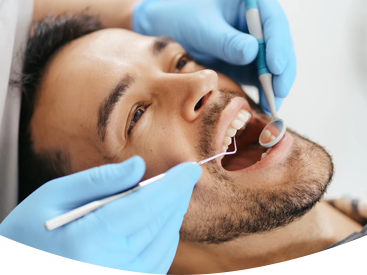Beyond Infinity Dental
Your Knowledgeable Dentist Near Beecroft
We’ve recently expanded our practice by 3X. Join us at our Grand Opening 🥂- Learn more

Dental Wellness Tailored to You

At our dental practice, we warmly welcome Beecroft families family to join us on a journey towards quality dental health. We’re dedicated to delivering effective dental care aimed at fostering a healthier, brighter smile for everyone in Beecroft. Beyond Infinity Dental is located just a 13-minute drive (7.4 km) from Beecroft.
Our experienced dentists, Dr Yang and Dr Lin, are passionate about dental and general health. They take a collaborative approach, working closely with other healthcare experts to provide holistic care tailored to the needs of families at our dental practice.
We eschew a one-size-fits-all methodology in favour of a personalised strategy. By crafting bespoke treatment plans based on your unique dental requirements, we offer a spectrum of options designed to help you achieve your dental goals efficiently and effectively.

WHY CHOOSE US AS YOUR DENTIST?
Effective ORAL HEALTH SERVICES

50 Years
Our team's 50-plus years of experience ensure uniquely personalised dental care at our dental practice.

Body and Mind
Embrace our holistic dental treatments designed to improve not only your oral health but also your complete body health.

Up-to-Date
We leverage the latest advancements in technology to enhance treatment outcomes and patient experiences.

Expertise
Our dental clinic is supported by skilled Oral Surgeons, Prosthetists, and Anaesthetists, ensuring expert care for every patient.

Chinese Spoken
Benefit from personalised dental consultations in Mandarin or Taiwanese, provided by our skilled multilingual dentists to better meet your needs.

National Dental Plan
Enjoy our zero-interest payment plan that breaks down the cost of your dental care into easy, budget-friendly instalments.
Our Dental Team

Dr Jack Yang
Principal Dentist
Dr Yang is a general dentist skilled in all areas of dental care. He has a special interest in cosmetic and aesthetic dentistry, crown and bridge work.
Mr Jack Yi-Chieh Yang AHPRA Registration No. DEN0001589137, type: General

Dr Jeff Lin
Principal Dentist
Dr Lin has a special interest in cosmetic and implant dentistry, where he has attended extensive hours of continuing education. He also improves his craft through his travels.
Dr Jeff Lin AHPRA Registration No. DEN0001162767, type: General
TREATMENTS
ADVANCE YOUR SMILE WITH MODERN LASER AND DIGITAL SOLUTIONS FROM OUR SKILLED DENTISTS.
UNVEIL 3 POPULAR DENTAL SOLUTIONS AT OUR CLINIC

Dental Implants
LOOK LIKE NATURAL TEETH
Implants are a robust and lasting way to replace missing teeth, designed to replicate natural dental aesthetics and functionality. Schedule a consultation today to discuss your possibilities.

Dental Veneers
CUSTOM DESIGNED
Discover the power of custom porcelain veneers to create the symmetrical smile you’ve dreamed of. Our experts are ready to guide you—book your consultation today.

Teeth Whitening
FREE TAKE-HOME WHITENING
Our clinic offers advanced teeth whitening technologies like the Epic laser system for in-chair treatment and Pola kits for at-home application. Schedule a consultation to determine the best approach for your needs.
OUR DENTAL SERVICES: PRIORITISING HEALTH AND CELEBRATING BEAUTY
Explore the comprehensive range of dental services at our clinic near Beecroft, where we go beyond ordinary care to deliver an extensive suite of advanced dental treatments. Our skilled professionals offer everything from general dental care to specialised procedures, including laser surgery, pinhole gum rejuvenation, rotary root canal therapy, advanced orthodontics, and bespoke cosmetic smile treatments.
Whether you need a routine check-up or an emergency appointment, our friendly team of dentists is here to ensure that each Beecroft resident receive the appropriate treatment in a comfortable and welcoming environment.
Are you looking for reliable dental care? Book your next appointment at Beyond Infinity Dental. You can easily schedule online or call us at (02) 8806 3799. We are the trusted choice for comprehensive and advanced dental solutions in the community.




7389
CAVITIES FIXED

8895
Brighter Smiles

9054
Treated Patients
TRUSTED PROVIDERS
Our Partners








What is cosmetic dentistry?
Cosmetic dentistry entails enhancing the aesthetics of teeth and smiles. It goes beyond the scope of general dentistry by offering treatments such as whitening, veneers, and aligners to enhance aesthetic appeal while also supporting overall oral health.
Do you accept new patients from Beecroft?
Yes! We are always happy to welcome new patients from Beecroft to our practice. Whether you’re looking for a family dentist or need emergency dental care, we’re just a short drive away and here to help you. Book an appointment now with a dental practice near Beecroft.
Can I book an emergency appointment?
Absolutely! We offer emergency dental appointments for situations like a broken tooth or sudden pain. Simply give us a call on (02) 8806 3799, and we’ll do our best to fit you in as soon as possible.
What are the stages of getting dental implants?
Initial Consultation
The journey to getting dental implants begins with an initial consultation. Here, dental professionals assess the patient’s oral health, discuss expectations, and review medical history to ensure suitability for implants. This stage is crucial for setting the foundation of trust and understanding between the patient and the provider, ensuring the delivery of professional service throughout the treatment.
Diagnostic Assessment
Following the consultation, detailed imaging (such as X-rays and CT scans) is performed to evaluate bone density and determine the accurate placement for the tooth implants. This phase is essential for crafting a precise surgical plan that caters to the anatomical needs of the patient.
Pre-Surgical Preparations
Prior to surgery, any existing oral health issues, such as gum disease, must be addressed to ensure the success of the implant. Dental assistants play a key role during this phase, preparing the patient and assisting in any preliminary treatments or cleanings.
Implant Placement Procedure
The placement of dental implants involves a surgical procedure where a titanium post is inserted into the jawbone. This post serves as the new root for the crown that will eventually be placed. The procedure typically requires local anaesthesia, and sedation options may be available for patient comfort.
Healing and Osseointegration
After the implant is placed, a critical period of healing begins, known as osseointegration, during which the jawbone grows around and bonds with the titanium post. This process can take several months and is vital for providing the stability needed to support the prosthetic tooth.
Abutment Attachment and Moulding
Once osseointegration is confirmed, an abutment is attached to the implant. This component serves as the connecting piece between the implant and the final crown. Impressions of the mouth are taken at this stage to ensure that the final prosthetic matches the surrounding teeth in shape and colour.
Placement of the Prosthetic Tooth
In the final step of dental implantation, the prosthetic tooth, or crown, is mounted onto the abutment. Crafted with precision, this crown blends with the patient’s original teeth, offering a natural look and full functionality.
Post-Operative Care and Maintenance
Following the placement of the implant, patients will receive guidance on how to care for their new teeth, including proper brushing, flossing, and regular dental check-ups. High-quality and affordable dentistry ensures that patients have access to necessary follow-up care to maintain the health and functionality of their implants.
What is a dental emergency?
A dental emergency encompasses any urgent oral health problem necessitating immediate attention from an emergency dentist to alleviate intense pain, halt continuous tissue bleeding, or safeguard a jeopardised tooth. These urgent conditions can rapidly worsen if not treated promptly, potentially leading to more serious health complications.
Common scenarios that qualify as dental emergencies include severe toothache, knocked-out teeth, partially dislodged (extruded) teeth, abscesses, soft tissue injuries in the mouth, and broken or fractured teeth that are causing significant pain or discomfort. A knocked-out tooth presents a critical situation where the time between the incident and treatment is crucial; ideally, the tooth should be reinserted within an hour. Hence, immediate contact with an emergency dentist is essential.
Furthermore, infections such as abscesses can be life-threatening if not addressed quickly. Symptoms of an abscess might include severe discomfort, swelling, pus, a foul taste in the mouth, and fever. In cases of emergency dental care, draining the abscess and prescribing antibiotics are vital steps to manage the infection.
In addition to the direct treatment of immediate issues, emergency dentists also play a key role in providing instructions for temporary measures that patients can take at home before reaching the dental clinic. This guidance could involve how to handle a knocked-out tooth, managing bleeding from a bitten tongue or lip, or temporarily alleviating pain with over-the-counter medication.
Visiting an emergency dentist during these critical times not only helps in managing pain but also significantly decreases the risk of developing further complications, ensuring that the patients receive an appropriate outcome for their dental health. In summary, a dental emergency requires swift action and professional care to address serious conditions that affect the teeth and supporting tissues.
What is the process for root canal procedures?
Step 1: Assessment and Diagnosis
The process begins with a thorough assessment where the dentist examines the affected tooth and surrounding gums. Detailed X-rays or sometimes a CT scan is used to visualise the extent of the damage and to plan the procedure effectively. This diagnostic phase is crucial for identifying the specific canals that house the nerve tissue and need treatment.
Step 2: Anaesthesia and Tooth Isolation
Local anaesthesia is administered around the affected tooth to ensure the patient’s comfort. Once numb, the tooth is isolated with a dental dam, a small sheet of rubber that keeps the tooth dry and free from saliva during the root canal treatment.
Step 3: Removing the Infected Pulp
To access the pulp chamber, the dentist drills an opening in the tooth’s crown. With specialised dental tools, they eliminate the infected or inflamed pulp tissue from the canal. This part of the procedure is delicate and requires precision to ensure all the diseased material is removed and to prevent further contamination.
Step 4: Shaping and Disinfecting
Once the pulp is removed, the empty canals must be carefully cleaned and shaped using tiny files. This shaping allows for efficient filling of the canal. Throughout this stage, the canals are flushed with disinfectants to eliminate residual bacteria and reduce the risk of further infection.
Step 5: Filling the Canal
After the cleaning and shaping process, gutta-percha, a biocompatible material, is used to fill the canals, which are then sealed with dental adhesive to maintain complete airtightness. This step is vital to prevent bacteria from re-entering the root canals.
Step 6: Restoring the Tooth
With the infection cleared and the root canal sealed, attention is turned to restoring the tooth. Typically, a tooth that has undergone a root canal will require a crown to protect it from fracture and restore its function and appearance. A temporary filling may be placed until the crown is fabricated and ready to be fitted.
Step 7: Follow-Up Care
After the procedure, follow-up appointments are essential to monitor the healing of the tooth and ensure the infection has been completely eradicated. The dentist will provide instructions on how to care for the tooth post-treatment, stressing the importance of maintaining good oral hygiene practices.
Note: Any surgical or invasive procedure carries risks. Before proceeding, you should seek a second opinion from an appropriately qualified health practitioner.
FIND YOUR SMILE SOLUTIONS
Explore effective dental solutions at our reputable dental practice, where quality care meets innovation.

